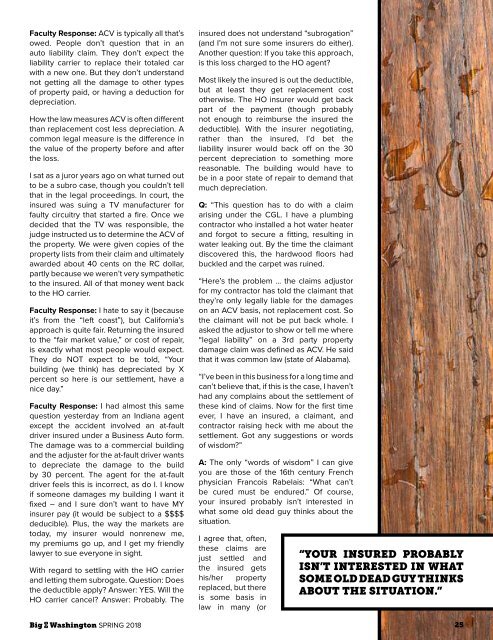You also want an ePaper? Increase the reach of your titles
YUMPU automatically turns print PDFs into web optimized ePapers that Google loves.
Faculty Response: ACV is typically all that’s<br />
owed. People don’t question that in an<br />
auto liability claim. <strong>The</strong>y don’t expect the<br />
liability carrier to replace their totaled car<br />
with a new one. But they don’t understand<br />
not getting all the damage to other types<br />
of property paid, or having a deduction for<br />
depreciation.<br />
How the law measures ACV is often different<br />
than replacement cost less depreciation. A<br />
common legal measure is the difference in<br />
the value of the property before and after<br />
the loss.<br />
I sat as a juror years ago on what turned out<br />
to be a subro case, though you couldn’t tell<br />
that in the legal proceedings. In court, the<br />
insured was suing a TV manufacturer for<br />
faulty circuitry that started a fire. Once we<br />
decided that the TV was responsible, the<br />
judge instructed us to determine the ACV of<br />
the property. We were given copies of the<br />
property lists from their claim and ultimately<br />
awarded about 40 cents on the RC dollar,<br />
partly because we weren’t very sympathetic<br />
to the insured. All of that money went back<br />
to the HO carrier.<br />
Faculty Response: I hate to say it (because<br />
it’s from the “left coast”), but California’s<br />
approach is quite fair. Returning the insured<br />
to the “fair market value,” or cost of repair,<br />
is exactly what most people would expect.<br />
<strong>The</strong>y do NOT expect to be told, “Your<br />
building (we think) has depreciated by X<br />
percent so here is our settlement, have a<br />
nice day.”<br />
Faculty Response: I had almost this same<br />
question yesterday from an Indiana agent<br />
except the accident involved an at-fault<br />
driver insured under a Business Auto form.<br />
<strong>The</strong> damage was to a commercial building<br />
and the adjuster for the at-fault driver wants<br />
to depreciate the damage to the build<br />
by 30 percent. <strong>The</strong> agent for the at-fault<br />
driver feels this is incorrect, as do I. I know<br />
if someone damages my building I want it<br />
fixed – and I sure don’t want to have MY<br />
insurer pay (it would be subject to a $$$$<br />
deducible). Plus, the way the markets are<br />
today, my insurer would nonrenew me,<br />
my premiums go up, and I get my friendly<br />
lawyer to sue everyone in sight.<br />
With regard to settling with the HO carrier<br />
and letting them subrogate. Question: Does<br />
the deductible apply? Answer: YES. Will the<br />
HO carrier cancel? Answer: Probably. <strong>The</strong><br />
insured does not understand “subrogation”<br />
(and I’m not sure some insurers do either).<br />
Another question: If you take this approach,<br />
is this loss charged to the HO agent?<br />
Most likely the insured is out the deductible,<br />
but at least they get replacement cost<br />
otherwise. <strong>The</strong> HO insurer would get back<br />
part of the payment (though probably<br />
not enough to reimburse the insured the<br />
deductible). With the insurer negotiating,<br />
rather than the insured, I’d bet the<br />
liability insurer would back off on the 30<br />
percent depreciation to something more<br />
reasonable. <strong>The</strong> building would have to<br />
be in a poor state of repair to demand that<br />
much depreciation.<br />
Q: “This question has to do with a claim<br />
arising under the CGL. I have a plumbing<br />
contractor who installed a hot water heater<br />
and forgot to secure a fitting, resulting in<br />
water leaking out. By the time the claimant<br />
discovered this, the hardwood floors had<br />
buckled and the carpet was ruined.<br />
“Here’s the problem ... the claims adjustor<br />
for my contractor has told the claimant that<br />
they’re only legally liable for the damages<br />
on an ACV basis, not replacement cost. So<br />
the claimant will not be put back whole. I<br />
asked the adjustor to show or tell me where<br />
“legal liability” on a 3rd party property<br />
damage claim was defined as ACV. He said<br />
that it was common law (state of Alabama).<br />
“I’ve been in this business for a long time and<br />
can’t believe that, if this is the case, I haven’t<br />
had any complains about the settlement of<br />
these kind of claims. Now for the first time<br />
ever, I have an insured, a claimant, and<br />
contractor raising heck with me about the<br />
settlement. Got any suggestions or words<br />
of wisdom?”<br />
A: <strong>The</strong> only “words of wisdom” I can give<br />
you are those of the 16th century French<br />
physician Francois Rabelais: “What can’t<br />
be cured must be endured.” Of course,<br />
your insured probably isn’t interested in<br />
what some old dead guy thinks about the<br />
situation.<br />
I agree that, often,<br />
these claims are<br />
just settled and<br />
the insured gets<br />
his/her property<br />
replaced, but there<br />
is some basis in<br />
law in many (or<br />
“YOUR INSURED PROBABLY<br />
ISN’T INTERESTED IN WHAT<br />
SOME OLD DEAD GUY THINKS<br />
ABOUT THE SITUATION.”<br />
<strong>Big</strong> <strong>Washington</strong> SPRING <strong>2018</strong> 25


















